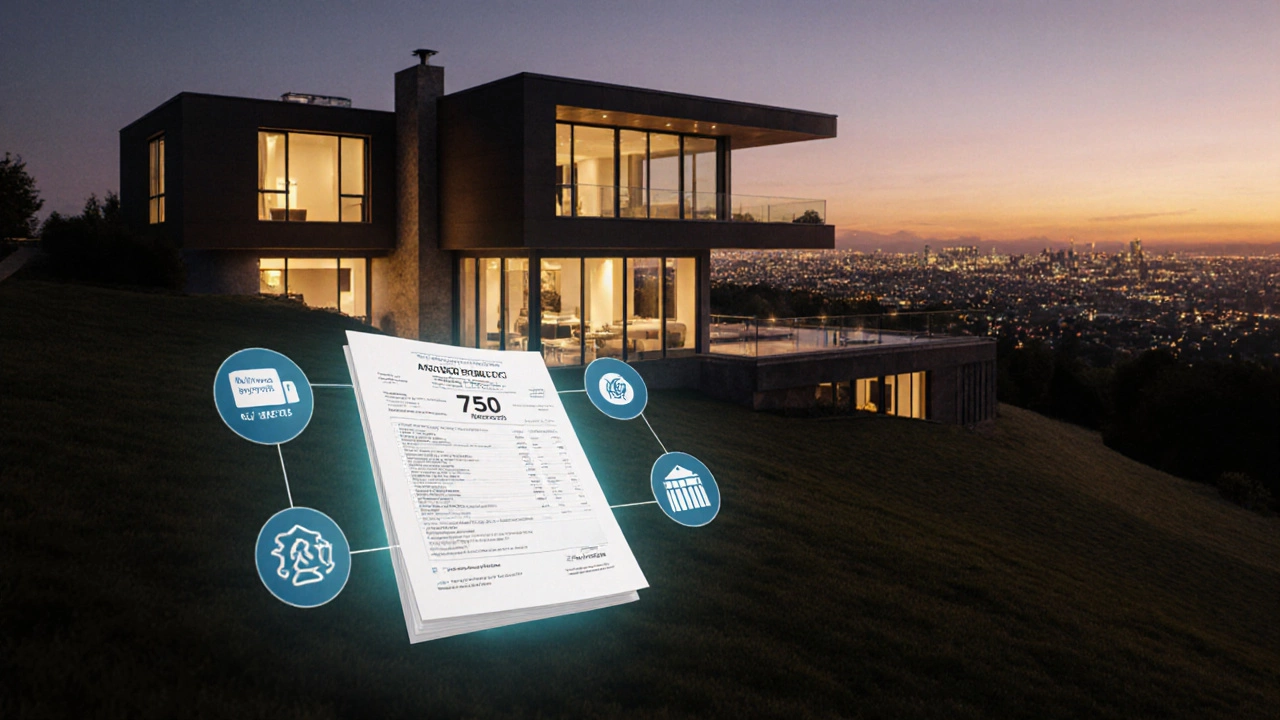Mortgage Qualification Calculator
Input Your Details
Results
Buying a $2 million house isn’t just about saving for a down payment-it’s about proving you can handle the kind of debt that most people only dream about. If you’re looking at a property in this range, you’re not just applying for a mortgage. You’re entering a different league of lending. And your credit score? It’s not just a number. It’s your ticket in the door.
Your credit score isn’t just important-it’s the gatekeeper
Most lenders won’t even look at your application for a $2 million home if your credit score is below 720. That’s not a suggestion. That’s the baseline. In New Zealand, major banks like ANZ, BNZ, and Westpac treat loans over $1.5 million as high-value mortgages. They apply stricter rules, and your credit score is the first filter they use.
Why? Because the risk is higher. A $2 million loan means a much bigger loss if you default. Lenders need to be sure you’ve consistently managed debt before. A score of 750 or higher is what you’ll see on successful applications. It’s not about being perfect-it’s about being predictable. If your score is 680, you’ll likely be turned down before they even ask for your bank statements.
What does a 750+ credit score look like in real life?
A credit score of 750+ doesn’t mean you’ve never missed a payment. It means you’ve managed multiple types of credit responsibly over years. Lenders look at:
- Payment history (70% of your score)-no late payments in the last 24 months
- Credit utilization (20%)-you’re using less than 30% of your total available credit
- Credit age (10%)-you’ve had at least one account open for 7+ years
Let’s say you’ve got a $15,000 credit card limit and you’re spending $4,500 a month. That’s 30% utilization-fine. But if you’re maxing out three cards and juggling personal loans, lenders will see financial stress, not stability.
One buyer I worked with had a $780 score. He paid off two credit cards over six months, kept his utilization under 15%, and didn’t apply for any new credit before applying for his mortgage. He got approved for $2.1 million with a 25% deposit. His score didn’t jump overnight-it was the result of steady, quiet habits.
Down payment matters more than you think
For a $2 million house, lenders usually want at least 20% down. That’s $400,000. But here’s the catch: if you can put down 30% or more, your credit score requirements soften slightly. A score of 700 might be acceptable with a 35% deposit. Why? Because the lender’s risk drops. You have more skin in the game.
Some buyers try to stretch to 10% down to preserve cash for renovations or furniture. Don’t. For luxury homes, lenders see low deposits as a red flag. They assume you’re overextending. Even if you have $1 million in savings, if you’re only putting $200,000 down, you’ll be asked to explain why.
Also, don’t forget about Lenders’ Mortgage Insurance (LMI). For loans over $1.5 million, LMI isn’t always required-but lenders often impose their own version of it. The bigger your deposit, the less scrutiny you face.

Income and debt ratios are just as important
Your credit score gets you in the room. But your income and debt-to-income ratio (DTI) decide if you get the keys.
Lenders use a rule of thumb: your total monthly debt payments (including the new mortgage) shouldn’t exceed 40% of your gross income. For a $2 million loan at 7.5% interest over 30 years, your monthly payment is roughly $14,500. That means you need a gross annual income of at least $435,000 just to clear the 40% threshold.
But here’s what most people miss: lenders look at all your debt. That includes car loans, student loans, personal loans, and even credit card minimum payments. If you’ve got $3,000 a month in other debt payments, your income needs to be closer to $500,000 to qualify.
One couple I advised had a combined income of $480,000 but were paying $5,200 a month in car loans and student debt. They were turned down. After paying off their car loan and consolidating student debt, their DTI dropped from 47% to 36%. Approval came two weeks later.
What lenders see beyond your score
For luxury mortgages, lenders don’t just check your credit file-they dig into your financial history. They want to see:
- Stable employment over 2+ years (self-employed? You’ll need 3 years of tax returns)
- Large deposits with clear sources (no mystery $100,000 transfers)
- No recent bankruptcies, defaults, or court judgments
- Proof of savings over time-not just a lump sum from a family gift
One buyer tried to use $300,000 from a recent crypto sale as his down payment. The bank flagged it. He had to provide transaction history, exchange statements, and a letter from his accountant. He got approved, but it took six weeks. Another buyer used a $200,000 inheritance. He had a lawyer’s letter and bank transfer records. Approved in 10 days.
Lenders don’t distrust you. They just need to be sure the money isn’t borrowed, risky, or temporary.

What if your credit score is below 700?
If your score is in the 600-699 range, buying a $2 million home is extremely difficult. But not impossible. You’ll need:
- A 40%+ down payment
- Significant liquid assets (at least $1 million in savings or investments)
- A co-signer with excellent credit and high income
- Specialist lenders who handle high-net-worth borrowers (not the big banks)
Private lenders and boutique mortgage brokers sometimes work with buyers who have lower scores but strong asset positions. These lenders charge higher interest-often 8.5% to 10%-and may require shorter loan terms (15-20 years). You’re paying for flexibility, not convenience.
Don’t try to fix your credit score right before applying. It takes time. If you’re serious about this, start 12-18 months ahead. Pay down debt. Don’t open new accounts. Check your credit report for errors. Dispute them. Even a 20-point boost can make the difference between approval and rejection.
What’s the fastest way to improve your credit score?
Here’s the reality: there’s no magic trick. But these steps work every time:
- Pay every bill on time-no exceptions. Set up auto-pay if you have to.
- Reduce credit card balances to under 20% of your limit.
- Don’t close old accounts-even if you don’t use them. Length of credit history matters.
- Avoid applying for new credit cards or loans in the 6 months before applying for a mortgage.
- Get a copy of your credit report from Credit Simple or Equifax. Look for mistakes. Dispute them immediately.
One client improved his score from 662 to 748 in 11 months by doing just these five things. He didn’t earn more money. He didn’t get a gift. He just stopped making small financial mistakes.
Final thought: It’s not about being rich-it’s about being responsible
People assume you need to be a millionaire to buy a $2 million house. That’s not true. You need to be financially disciplined. You need to show lenders you’ve earned trust over time. A high credit score isn’t a reward for wealth. It’s proof you handle responsibility well.
If you’re planning to buy in this range, start now. Don’t wait until you’ve found the house. Start fixing your credit, building your savings, and trimming your debt. The right home will still be there in a year. But your credit score? It won’t fix itself overnight.
Can you buy a $2 million house with a 650 credit score?
It’s extremely difficult. Most major lenders require at least a 720 score for loans this size. With a 650 score, you’d need a 40%+ down payment, significant liquid assets, and a co-signer with excellent credit. You might qualify with a private lender, but expect higher interest rates and stricter terms.
How much income do I need for a $2 million mortgage?
You’ll need a gross annual income of at least $435,000 to comfortably qualify for a $2 million mortgage at 7.5% interest over 30 years. This assumes no other debt. If you have car loans, student debt, or credit card payments, your income needs to be higher-often $500,000 or more.
Do I need a 30% down payment for a $2 million home?
While 20% ($400,000) is the minimum most lenders accept, 30% or more is strongly preferred. A larger deposit reduces risk for the lender and can improve your chances of approval-even if your credit score isn’t perfect. It also lowers your monthly payments and reduces the chance of being asked for extra documentation.
Can I use gifted money for the down payment?
Yes, but you’ll need a formal gift letter from the donor, proof of their funds, and bank transfer records. Lenders want to make sure the money isn’t a disguised loan. If the gift comes from a family member, they may need to show their own financial stability too.
How long does it take to improve a credit score for a luxury home loan?
It takes at least 6-12 months to make a meaningful improvement. If your score is below 700, start 12-18 months before you plan to buy. Focus on paying bills on time, lowering credit card balances, and avoiding new credit applications. Quick fixes rarely work-consistency does.


Corbin Fairweather
I am an expert in real estate focusing on property sales and rentals. I enjoy writing about the latest trends in the real estate market and sharing insights on how to make successful property investments. My passion lies in helping clients find their dream homes and navigating the complexities of real estate transactions. In my free time, I enjoy hiking and capturing the beauty of landscapes through photography.
view all postsWrite a comment